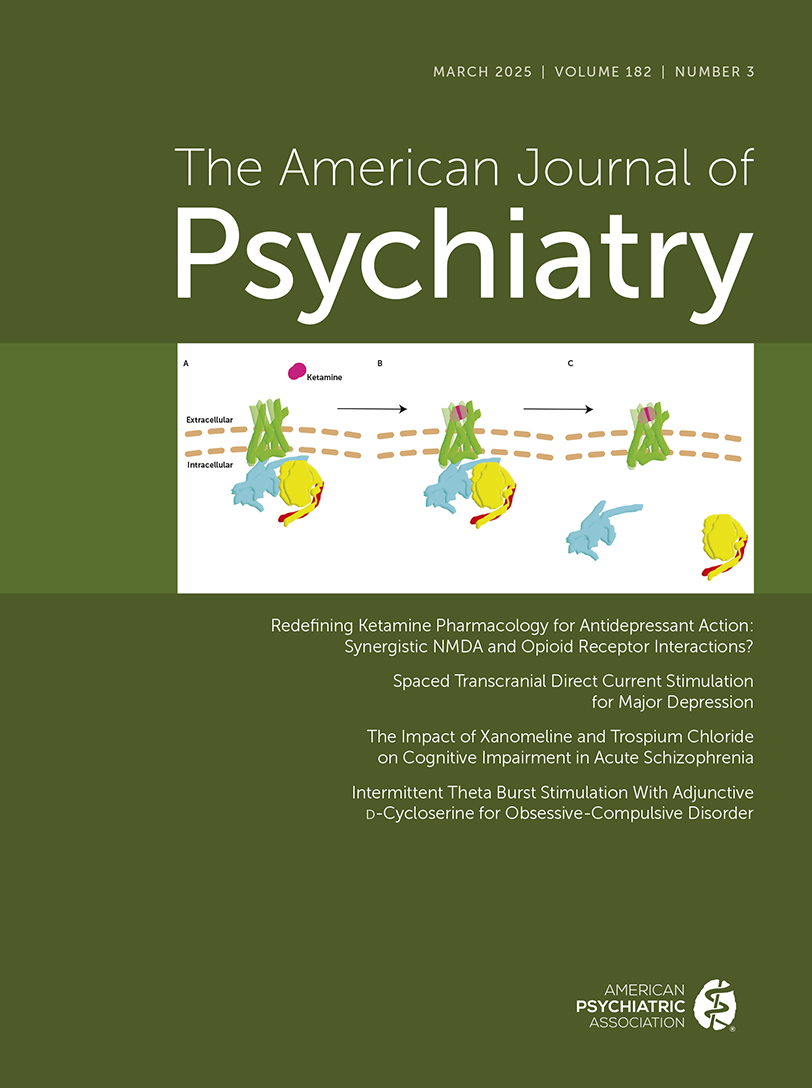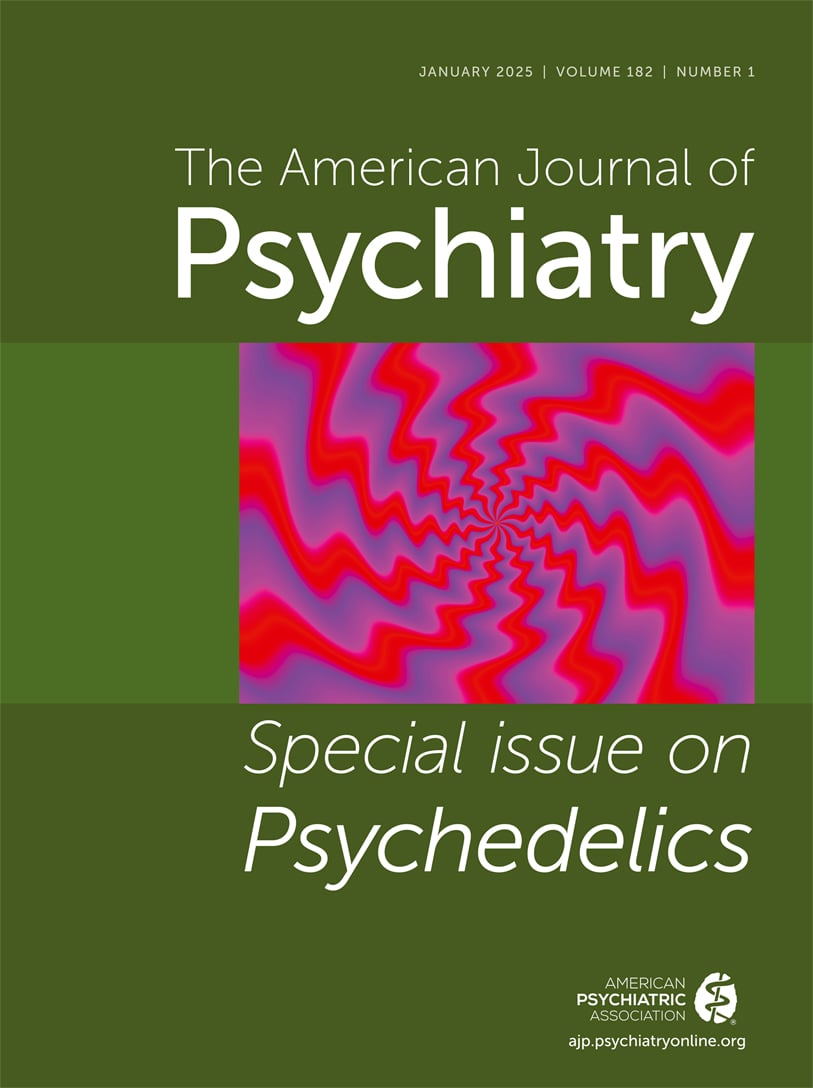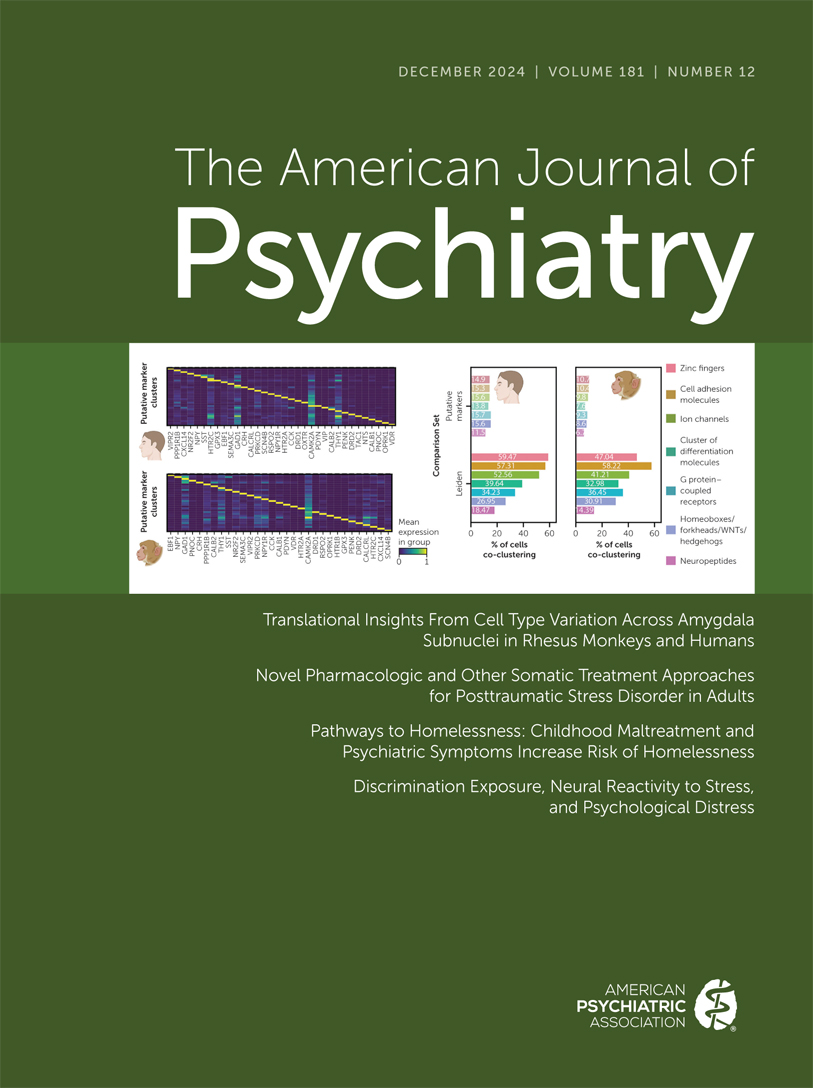American Journal of Psychiatry
- Volume 158
- Number 3
- March 2001
Editorial
Reviews and Overviews
Publication date: 01 March 2001
Pages351–359OBJECTIVE: This article offers selective reviews of cogent sectors of research regarding the dream in contemporary psychiatry. METHOD: First, the author discusses relatively recent research (1953–1999) on the neurobiology and clinical psychophysiology of ...
https://doi.org/10.1176/appi.ajp.158.3.351Publication date: 01 March 2001
Pages360–369OBJECTIVE: Although atypical antipsychotics are becoming the treatment of choice for schizophrenia, what makes an antipsychotic “atypical” is not clear. This article provides a new hypothesis about the mechanism of action of atypical antipsychotics. ...
https://doi.org/10.1176/appi.ajp.158.3.360Images in Neuroscience
Clinical Case Conference
Images in Psychiatry
Article
Association of Dopamine Transporter Reduction With Psychomotor Impairment in Methamphetamine Abusers
Publication date: 01 March 2001
Pages377–382OBJECTIVE: Methamphetamine is a popular and highly addictive drug of abuse that has raised concerns because it has been shown in laboratory animals to be neurotoxic to dopamine terminals. The authors evaluated if similar changes occur in humans and ...
https://doi.org/10.1176/appi.ajp.158.3.377Publication date: 01 March 2001
Pages383–389OBJECTIVE: Methamphetamine has raised concerns because it may be neurotoxic to the human brain. Although prior work has focused primarily on the effects of methamphetamine on dopamine cells, there is evidence that other neuronal types are affected. The ...
https://doi.org/10.1176/appi.ajp.158.3.383Publication date: 01 March 2001
Pages390–398OBJECTIVE: The limbic system plays a critical role in motivation, emotional expression, and memory. The authors investigated whether a state of permanent limbic neuronal hyperexcitability, or sensitization, is present in cocaine addicts as a consequence ...
https://doi.org/10.1176/appi.ajp.158.3.390Publication date: 01 March 2001
Pages399–404OBJECTIVE: This study was an investigation of the frequencies of insomnia and its self-medication with alcohol in a group of alcoholic patients, as well as the relationship of these variables to alcoholic relapse. METHOD: The subjects were 172 men and ...
https://doi.org/10.1176/appi.ajp.158.3.399Publication date: 01 March 2001
Pages405–415OBJECTIVE: The anterior cingulate cortex has been implicated in depression. Results are best interpreted by considering anatomic and cytoarchitectonic subdivisions. Evidence suggests depression is characterized by hypoactivity in the dorsal anterior ...
https://doi.org/10.1176/appi.ajp.158.3.405Publication date: 01 March 2001
Pages416–419OBJECTIVE: The authors’ goal was to examine whether depression is associated with overreporting of functional disability. METHOD: The subjects were 304 patients 60 years old or older who were recruited from primary care settings. Measures included ...
https://doi.org/10.1176/appi.ajp.158.3.416Publication date: 01 March 2001
Pages420–426OBJECTIVE: Bipolar disorder often co-occurs with other axis I disorders, but little is known about the relationships between the clinical features of bipolar illness and these comorbid conditions. Therefore, the authors assessed comorbid lifetime and ...
https://doi.org/10.1176/appi.ajp.158.3.420Publication date: 01 March 2001
Pages427–432OBJECTIVE: Individuals who mutilate themselves are at greater risk for suicidal behavior. Clinically, however, there is a perception that the suicide attempts of self-mutilators are motivated by the desire for attention rather than by a genuine wish to ...
https://doi.org/10.1176/appi.ajp.158.3.427Publication date: 01 March 2001
Pages433–439OBJECTIVE: The authors investigated whether self-reported life satisfaction predicted suicide over a period of 20 years (1976–1995) in adults unselected for mental health status. METHOD: A nationwide sample of adults aged 18–64 years (N=29,173) from the ...
https://doi.org/10.1176/appi.ajp.158.3.433Publication date: 01 March 2001
Pages440–446OBJECTIVE: Schizophrenia following a traumatic brain injury could be a phenocopy of genetic schizophrenia or the consequence of a gene-environment interaction. Alternatively, traumatic brain injury and schizophrenia could be spuriously associated if those ...
https://doi.org/10.1176/appi.ajp.158.3.440Publication date: 01 March 2001
Pages447–453OBJECTIVE: Velocardiofacial syndrome results from a microdeletion on chromosome 22 (22q11.2). Clinical studies indicate that more than 30% of children with the syndrome will develop schizophrenia. The authors sought to determine whether neuroanatomical ...
https://doi.org/10.1176/appi.ajp.158.3.447Publication date: 01 March 2001
Pages454–459OBJECTIVE: The possibility that delusions of influence could be related to abnormal recognition of one’s own actions was investigated in persons with schizophrenia. METHOD: Schizophrenic patients with (N=6) and without (N=18) delusions of influence were ...
https://doi.org/10.1176/appi.ajp.158.3.454Publication date: 01 March 2001
Pages460–466OBJECTIVE: Assessment of functional status is increasingly important in clinical trials and outcome research. Although several scales for assessing functioning are widely used, they vary in coverage, and direct comparisons among them are rare. Comparative ...
https://doi.org/10.1176/appi.ajp.158.3.460Publication date: 01 March 2001
Pages467–473OBJECTIVE: There is widespread agreement that the concept of defense is useful, but large-scale studies with representative cohorts are lacking. Self-report measures capturing conscious derivatives of defense can facilitate such studies. The authors ...
https://doi.org/10.1176/appi.ajp.158.3.467Publication date: 01 March 2001
Pages474–478OBJECTIVE: This study determined the risk of discipline by a medical board for psychiatrists relative to other physicians and assessed the contributions to such risk. METHOD: Physicians disciplined by the California Medical Board in a 30-month period were ...
https://doi.org/10.1176/appi.ajp.158.3.474Brief Report
Publication date: 01 March 2001
Pages479–481OBJECTIVE: The authors’ goal was to examine the extent to which perceived stigma affected treatment discontinuation in young and older adults with major depression. METHOD: A two-stage sampling design identified 92 new admissions of outpatients with major ...
https://doi.org/10.1176/appi.ajp.158.3.479Publication date: 01 March 2001
Pages481–483OBJECTIVE: The illicit use of hallucinogens is reemerging in the United States, especially among well-educated adults and teenagers. These same groups are also frequent users of the Internet. The authors sought to characterize the extent of information ...
https://doi.org/10.1176/appi.ajp.158.3.481Publication date: 01 March 2001
Pages484–486OBJECTIVE: High rates of medical morbidity have been reported in subjects with posttraumatic stress disorder (PTSD). The authors examined immune function in subjects in remission from past PTSD. METHOD: The initial study group was composed of 1,550 ...
https://doi.org/10.1176/appi.ajp.158.3.484Publication date: 01 March 2001
Pages486–489OBJECTIVE: Deficits in dopaminergic function may contribute to hypertrophy of striatal structures associated with typical neuroleptic treatment. In light of a body of research that has associated chronic cocaine use with extrapyramidal symptoms and ...
https://doi.org/10.1176/appi.ajp.158.3.486Publication date: 01 March 2001
Pages489–492OBJECTIVE: The authors address whether a possible age-at-onset cohort effect may have introduced a bias into anticipation studies of schizophrenia. METHOD: A retrospective review of the medical records of all admissions for psychotic disorders (N=877) was ...
https://doi.org/10.1176/appi.ajp.158.3.489Publication date: 01 March 2001
Pages492–494OBJECTIVE: The authors compared impulsivity, sensation seeking, and anhedonia in a group of schizophrenic patients with and without lifetime substance abuse or dependence. METHOD: Patients (N=100) with schizophrenia or schizoaffective disorder (per DSM-...
https://doi.org/10.1176/appi.ajp.158.3.492Publication date: 01 March 2001
Pages494–496OBJECTIVE: The authors used magnetic resonance imaging to corroborate the postmortem finding of right frontal hypergyria associated with schizophrenia. METHOD: Twelve affected-unaffected sibling pairs from families multiply affected with schizophrenia ...
https://doi.org/10.1176/appi.ajp.158.3.494Letter to the Editor
Book Forum: Psychoanalysis
Book Forum: Mood Disorders
Book Forum: Obsessive-Compulsive Disorder
Book Forum: Disorders of Childhood and Beyond
Past Issues
View Issues Archive
Vol. 182 | No. 3

Vol. 182 | No. 2

Vol. 182 | No. 1
